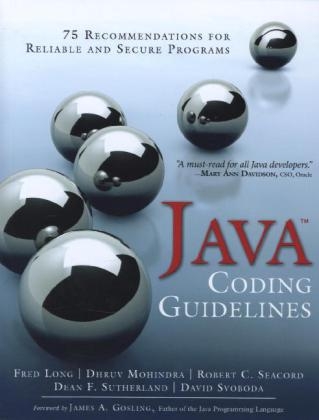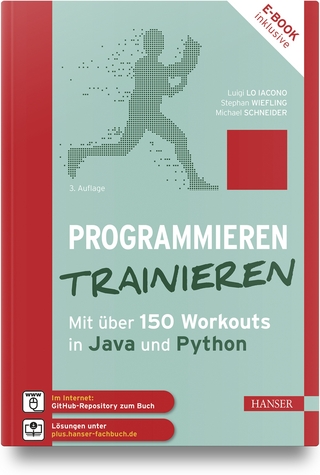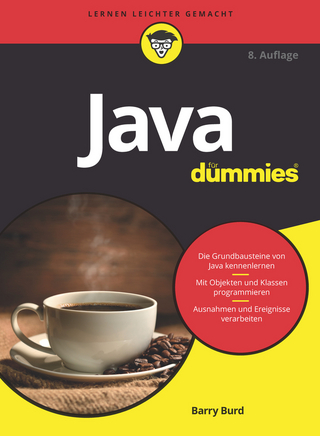
Java Coding Guidelines
Addison-Wesley Educational Publishers Inc (Verlag)
978-0-321-93315-7 (ISBN)
- Titel ist leider vergriffen;
keine Neuauflage - Artikel merken
-Mary Ann Davidson, Chief Security Officer, Oracle Corporation
Organizations worldwide rely on Java code to perform mission-critical tasks, and therefore that code must be reliable, robust, fast, maintainable, and secure. Java (TM) Coding Guidelines brings together expert guidelines, recommendations, and code examples to help you meet these demands.
Written by the same team that brought you The CERT (R) Oracle (R) Secure Coding Standard for Java (TM), this guide extends that previous work's expert security advice to address many additional quality attributes.
You'll find 75 guidelines, each presented consistently and intuitively. For each guideline, conformance requirements are specified; for most, noncompliant code examples and compliant solutions are also offered. The authors explain when to apply each guideline and provide references to even more detailed information.
Reflecting pioneering research on Java security, Java (TM) Coding Guidelines offers updated techniques for protecting against both deliberate attacks and other unexpected events. You'll find best practices for improving code reliability and clarity, and a full chapter exposing common misunderstandings that lead to suboptimal code.
With a Foreword by James A. Gosling, Father of the Java Programming Language
Fred Long is a senior lecturer in the Department of Computer Science, Aberystwyth University, in the United Kingdom. He is chairman of the British Computer Society's Mid-Wales Branch. Fred has been a visiting scientist at the Software Engineering Institute (SEI) since 1992. Recently, his research has involved the investigation of vulnerabilities in Java. Fred is also a coauthor of The CERT (R) Oracle (R) Secure Coding Standard for Java (TM) (Addison-Wesley, 2012). Dhruv Mohindra is a technical lead in the security practices group that is part of the CTO's office at Persistent Systems Limited, India, where he provides information security consulting solutions across various technology verticals such as cloud, collaboration, banking and finance, telecommunications, enterprise, mobility, life sciences, and health care. Dhruv has worked for CERT at the Software Engineering Institute and continues to collaborate to improve the state of security awareness in the programming community. Dhruv is also a coauthor of The CERT (R) Oracle (R) Secure Coding Standard for Java (TM) (Addison-Wesley, 2012). Robert C. Seacord is the Secure Coding Initiative technical manager in the CERT Program of Carnegie Mellon's Software Engineering Institute (SEI) in Pittsburgh, Pennsylvania. Robert is also a professor in the School of Computer and the Information Networking Institute at Carnegie Mellon University. He is the author of The CERT C Secure Coding Standard (Addison-Wesley, 2008), and is coauthor of Building Systems from Commercial Components (Addison-Wesley, 2002), Modernizing Legacy Systems (Addison-Wesley, 2003), The CERT (R) Oracle (R) Secure Coding Standard for Java (TM) (Addison-Wesley, 2012), and Secure Coding in C and C++ (Addison-Wesley, 2013). Dean F. Sutherland is a senior software security engineer at CERT. Dean received his Ph.D. in software engineering from Carnegie Mellon in 2008. Before his return to academia, he spent 14 years working as a professional software engineer at Tartan, Inc. He spent the last six of those years as a senior member of the technical staff and a technical lead for compiler backend technology. Dean is also a coauthor of The CERT (R) Oracle (R) Secure Coding Standard for Java (TM) (Addison-Wesley, 2012). David Svoboda is a software security engineer at CERT/SEI. He also maintains the CERT Secure Coding standard websites for Java, as well as C, C++, and Perl. David has been the primary developer on a diverse set of software development projects at Carnegie Mellon since 1991, ranging from hierarchical chip modeling and social organization simulation to automated machine translation (AMT). David is also a coauthor of The CERT (R) Oracle (R) Secure Coding Standard for Java (TM) (Addison-Wesley, 2012).
Chapter 1: Security
Chapter 2: Defensive Programming
Chapter 3: Reliability
Chapter 4: Program Understandability
Chapter 5: Programmer Misconceptions
Appendix A: Android
Glossary
References
Index
| Reihe/Serie | SEI Series in Software Engineering |
|---|---|
| Verlagsort | New Jersey |
| Sprache | englisch |
| Maße | 175 x 230 mm |
| Gewicht | 482 g |
| Themenwelt | Informatik ► Programmiersprachen / -werkzeuge ► Java |
| Informatik ► Software Entwicklung ► Objektorientierung | |
| Mathematik / Informatik ► Informatik ► Web / Internet | |
| ISBN-10 | 0-321-93315-X / 032193315X |
| ISBN-13 | 978-0-321-93315-7 / 9780321933157 |
| Zustand | Neuware |
| Haben Sie eine Frage zum Produkt? |
aus dem Bereich


